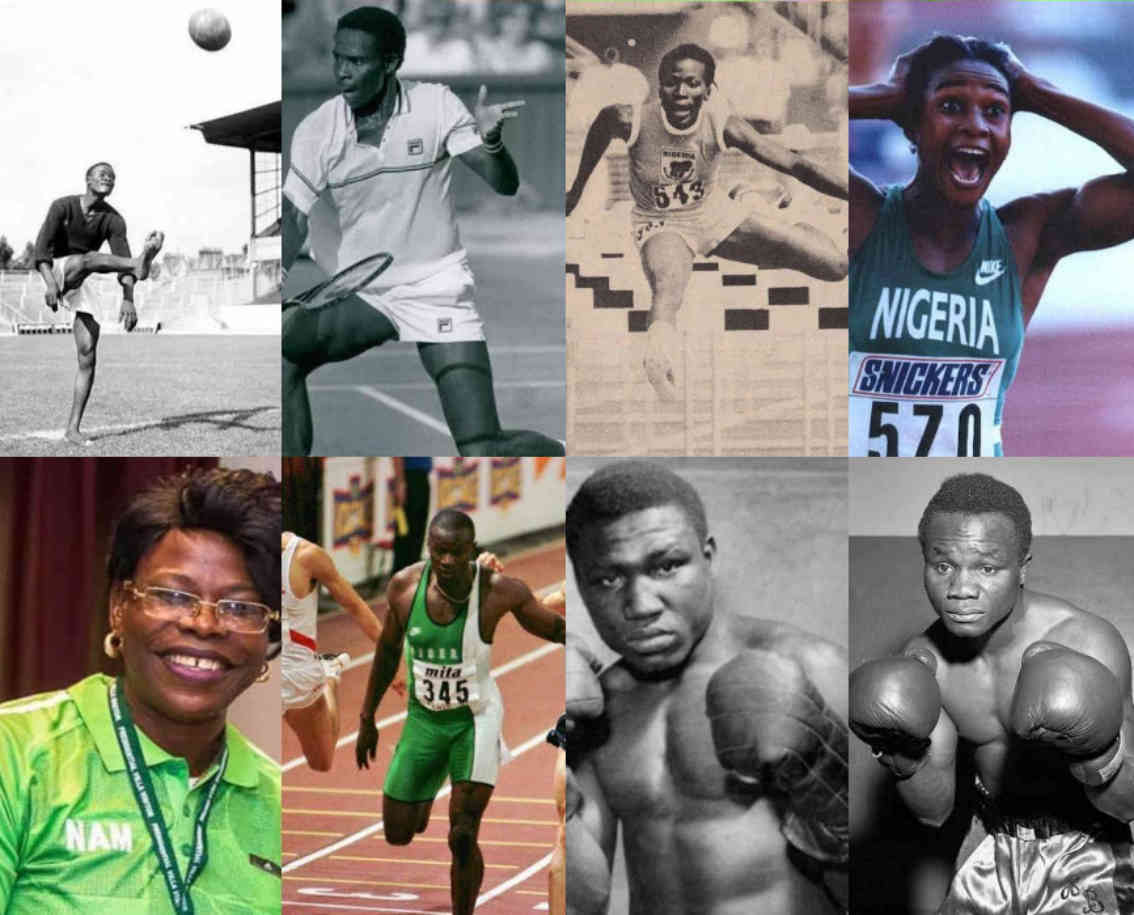There are so many Nigerian sports heroes in both male and female, who have made a name for themselves but have been forgotten at times.
Sports in Nigeria have been a big culture for decades, and there are many individuals who have put together country’s name on the global map.
Some of them have gone on to make better lives for themselves after retirement, while others were unable to make much of themselves due to various reasons.
The list is endless when we start talking about the forgotten heroes of Nigerian sports who made their mark in one way or another for today’s generation.
Here are ten legends who deserve to be front and centre again due to who they were, what they did, and why their flowers are long overdue after paving the way for today’s big names.
Table of Contents
10. Hogan “Kid” Bassey – Boxing
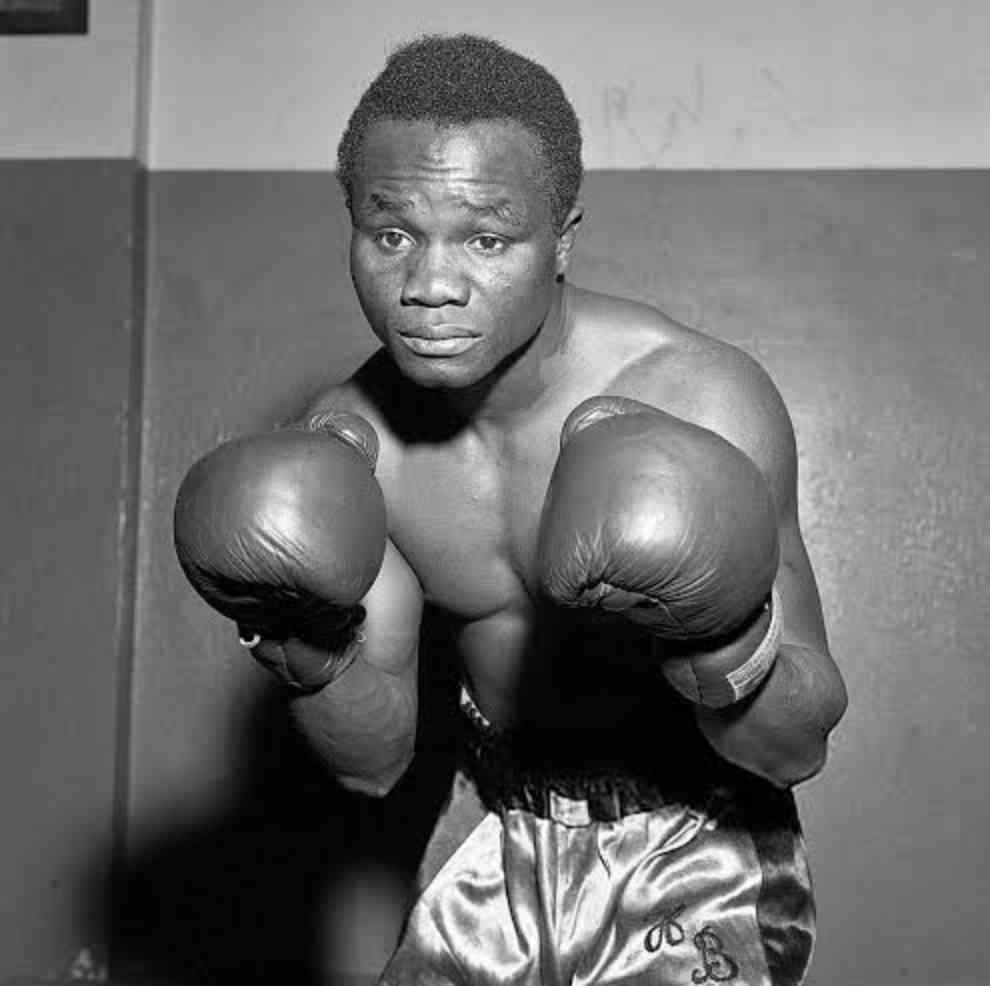
Hogan Bassey (Okon Asuquo Bassey, 1932–1998) holds the honour of being Nigeria’s first world champion in any sport. His rise in the 1950s was nothing short of trailblazing.
In 1957, he won the World Featherweight title in Paris after defeating Cherif Hamia in a thrilling contest. Bassey’s Feat was monumental, as no Nigerian had ever held a world title at that time.
He was known for his aggressive style, resilience, and knockout power. He inspired a generation of African fighters and became a reference point for Nigerian boxing’s global reputation.
His impact on Nigerian sports is something many might not talk about, but he sure played a huge role in its success today, which also spread across Africa at large.
Despite his status and his massive roles during his active days, today his name is barely celebrated or mentioned when discussions of Nigerian sports legends come up.
Bassey Career Highlights
| Full Name | Okon Asuquo Bassey (Hogan “Kid” Bassey) |
|---|---|
| Born | 3 June 1932 — Creek Town, Calabar, Nigeria |
| Died | 26 January 1998 — Apapa, Lagos, Nigeria |
| Height / Stance | 5 ft 3 in (160 cm) / Orthodox |
| Active Years | 1949 — 1959 |
| Career Record | 59 Wins • 13 Losses • 2 Draws |
| World Featherweight Champion (WBA / The Ring) | 1957 – 1959 |
| British Empire / Commonwealth Featherweight Champion | 1955 |
| Nigerian National Titles | Flyweight, Bantamweight |
| Honours | MBE (1958), MON (Member of the Order of the Niger) |
| Date | Opponent | Result |
|---|---|---|
| 24 Jun 1957 | Cherif Hamia | Win (Decision) |
| 18 Mar 1959 | Davey Moore | Loss (RTD, 13th round) |
| 1955 | Billy “Spider” Kelly | Win |
| Apr 1957 | Percy Lewis | Win |
9. Dick Tiger (Richard Ihetu) – Boxing
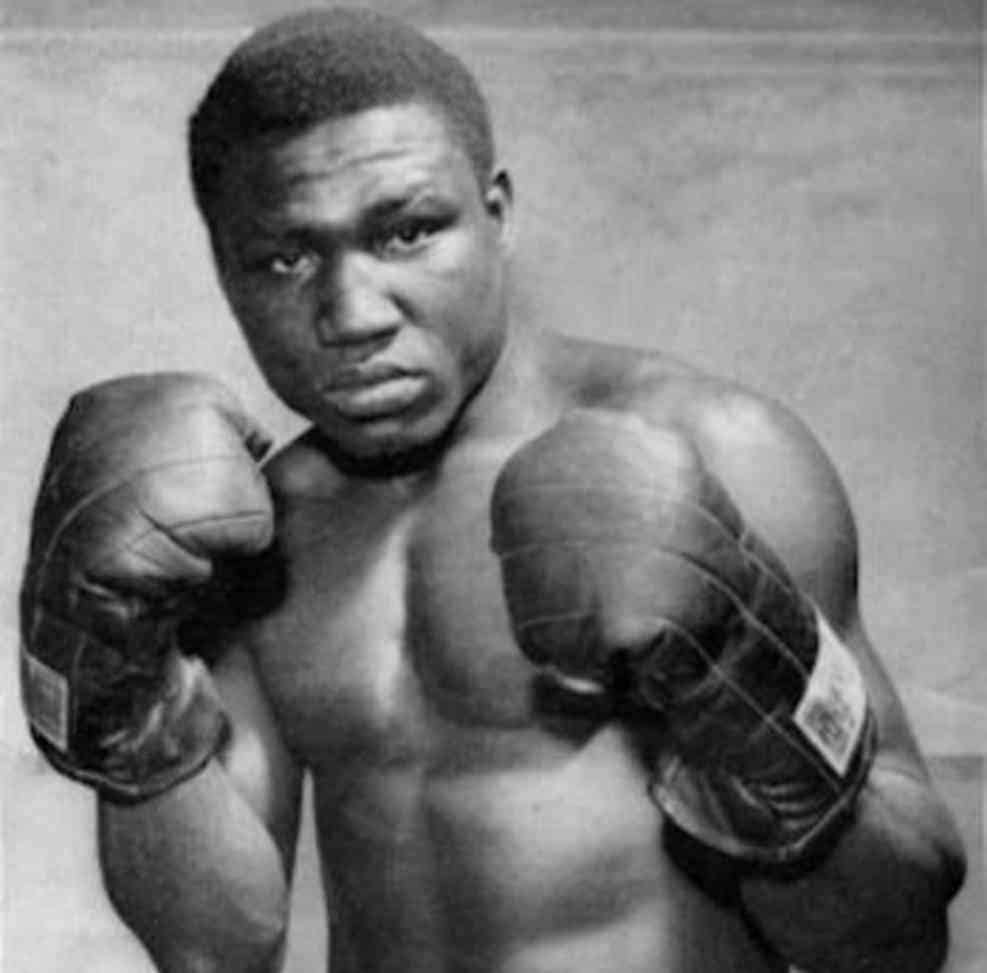
Dick Tiger (1929–1971) was a two-division world champion, dominating the middleweight and light-heavyweight divisions in the 1960s. He fought and defeated some of the biggest names of his era, including Gene Fullmer and Jose Torres.
Tiger’s career symbolised Nigerian tenacity on the world stage. He eventually became a cultural ambassador, bridging Nigeria and the United States through sport.
Inducted into the International Boxing Hall of Fame, Tiger is still regarded globally as one of Africa’s greatest fighters. Unfortunately, within Nigeria, his legacy is often overshadowed.
Understandably, his name is barely mentioned because he spent his time during the early 1960s, which was back when sports weren’t as well-documented in Nigeria.
However, his legacy is remembered by many who witnessed him at the very peak of his career when he was an unstoppable force, knocking opponents down.
Tiger Career Highlights
| Full Name | Richard Ihetu (Dick Tiger) |
|---|---|
| Born | 14 August 1929 — Amaigbo, Imo State, Nigeria |
| Died | 14 December 1971 — Aba, Nigeria |
| Height / Stance | 5 ft 8 in (173 cm) / Orthodox |
| Active Years | 1952 — 1970 |
| Career Record | 60 Wins • 19 Losses • 3 Draws |
| World Middleweight Champion | 1962 – 1963, 1965 – 1966 |
| World Light Heavyweight Champion | 1966 – 1968 |
| Commonwealth & Nigerian National Titles | Early Career |
| Honours | Member of the Order of the British Empire (MBE) |
| Hall of Fame | International Boxing Hall of Fame (Inducted 1991) |
| Date | Opponent | Result |
|---|---|---|
| 23 Oct 1962 | Gene Fullmer | Win (Decision) — Won World Middleweight Title |
| 21 Feb 1963 | Gene Fullmer | Draw — Retained Middleweight Title |
| 14 Oct 1965 | Giovanni Benvenuti | Win — Regained World Middleweight Title |
| 16 Dec 1966 | José Torres | Win (Decision) — Won World Light Heavyweight Title |
| 17 May 1968 | Bob Foster | Loss (KO, 4th round) — Lost Light Heavyweight Title |
8. Nojim Maiyegun – Boxing
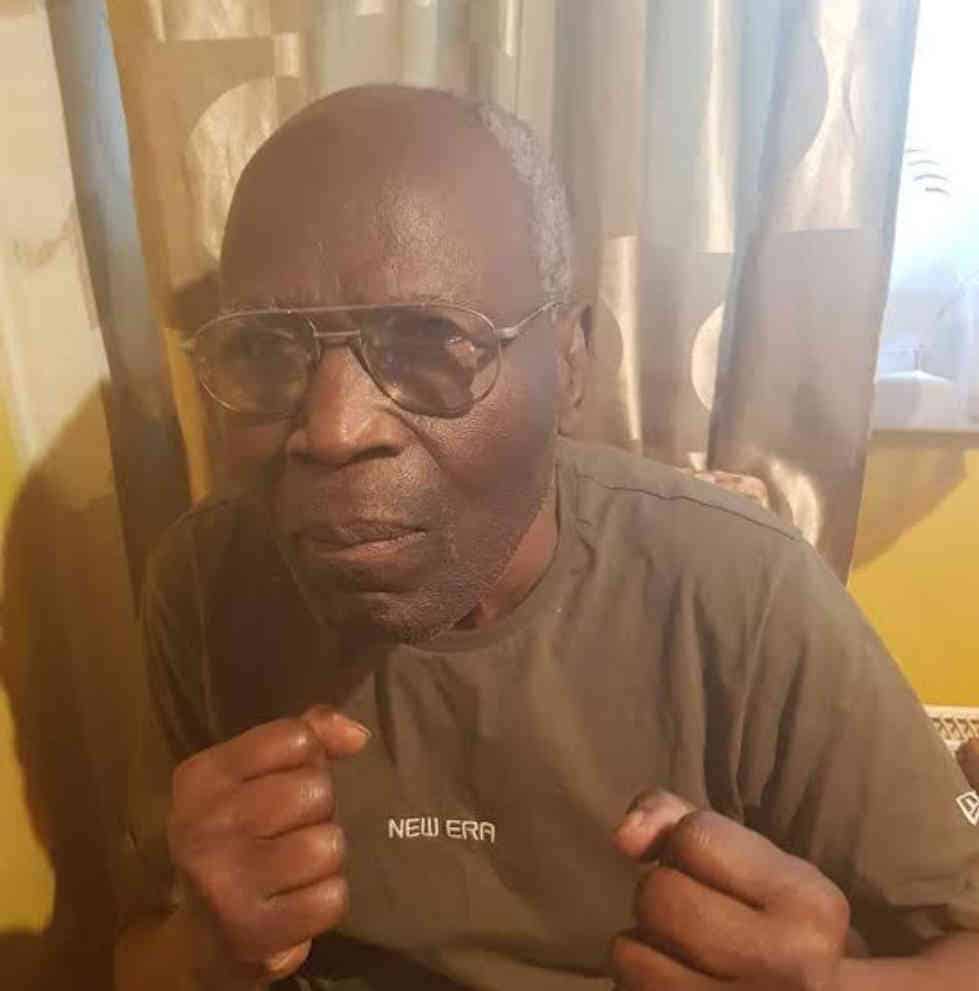
Nojim “Big-Punching” Maiyegun (1941–2024) was Nigeria’s first-ever Olympic medalist, winning a bronze in light-middleweight boxing at the 1964 Tokyo Olympics.
His achievement placed Nigeria permanently on the Olympic map. He also won Bronze at the 1966 Commonwealth Games, before turning professional in 1971.
Across 16 professional bouts, he recorded 12 wins, 10 by knockout. His career was cut short by vision problems, which came at a bad time in his life and ensuring he didn’t live up to many expectations.
Despite his history-making achievements, Maiyegun lived much of his later life quietly in Austria, with little recognition back home in Nigeria, where he should have been celebrated.
Maiyegun Career Highlights
| Full Name | Nojim Maiyegun |
|---|---|
| Born | 1941 — Nigeria |
| Division | Light Middleweight (Amateur & Professional) |
| Active Years | 1960s (Amateur) — 1970s (Professional) |
| Olympic Games (Tokyo) | 1964 — Bronze Medal (Light Middleweight) |
| First Nigerian Olympic Medalist | 1964 |
| Professional Career | Competed in Europe, primarily based in Austria |
| Year | Event / Opponent | Result |
|---|---|---|
| 1964 | Tokyo Olympics — Light Middleweight Semi-Finals | Bronze Medal (Nigeria’s First Olympic Medal) |
| 1960s–70s | Professional bouts in Austria and Europe | Mixed record (details vary by source) |
7. Sunday Bada – Athletics (400m)
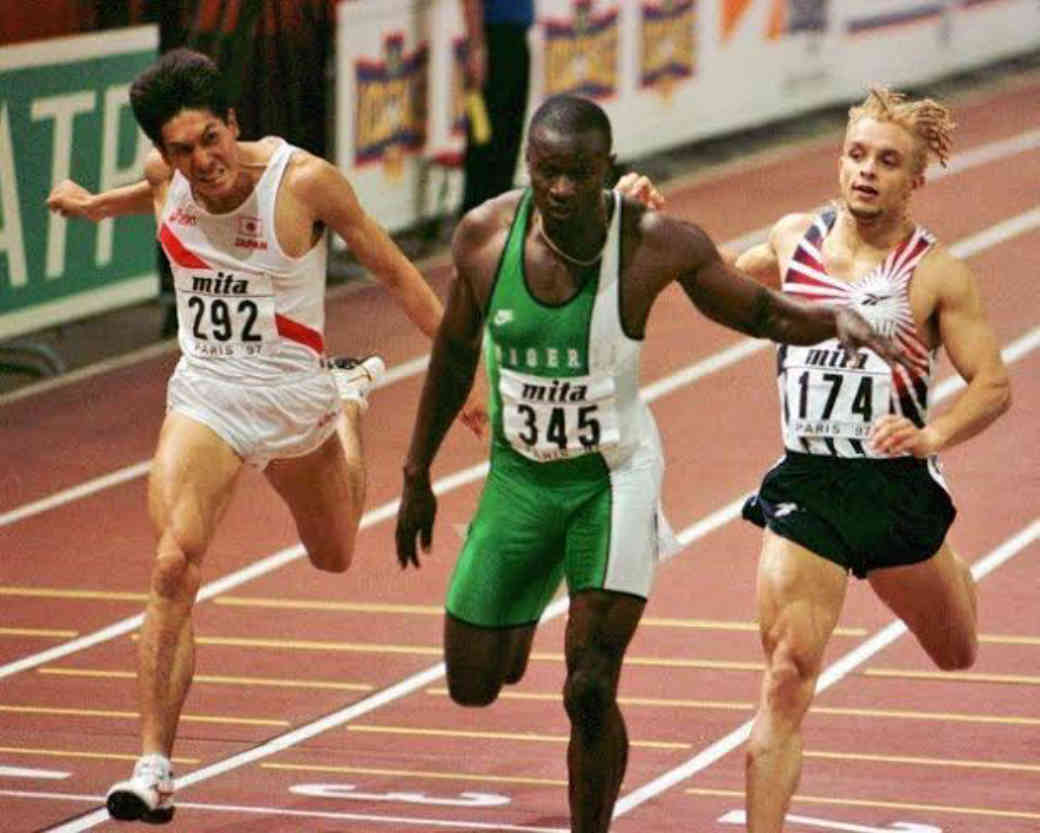 Sunday Bada (1969–2011) was one of Nigeria’s most consistent sprinters. He became World Indoor Champion (400m) in 1997, setting an African indoor record of 45.51s.
Sunday Bada (1969–2011) was one of Nigeria’s most consistent sprinters. He became World Indoor Champion (400m) in 1997, setting an African indoor record of 45.51s.
He created an Outdoors personal best, which was an impressive 44.63s. Sunday Bada was part of Nigeria’s 4×400m relay team at the Sydney 2000 Olympics.
The team initially received Silver but was later upgraded to gold after the disqualification of the U.S. squad. Nigeria’s relay time (2:58.68) remains a national record.
After retiring, Bada served as Technical Director of the Athletics Federation of Nigeria. His sudden death in 2011 was a huge loss for Nigerian athletics.
Despite his death, he still remains a big name in athletics thanks to his post-retirement job, which kept him inside the industry where he built with his own hands during his active days.
Career Highlights
| Full Name | Sunday Bada |
|---|---|
| Born | 22 June 1969 — Kaduna, Nigeria |
| Died | 12 December 2011 — Lagos, Nigeria |
| Specialty | 400 metres sprint |
| Personal Best | 44.63 sec (1993, Stuttgart World Championships) |
| Olympic Games | 1996 Atlanta — 4×400m Relay Gold (later awarded in 2000) |
| World Indoor Championships | 1997 Paris — Gold, 400m |
| African Championships | 1990 (Silver), 1993 (Gold), 1996 (Silver) — 400m |
| All-Africa Games | 1991 (Silver, 400m), 1995 (Gold, 400m) |
| National Records | Former Nigerian record holder — 400m (44.63s) |
| Year | Event | Result |
|---|---|---|
| 1992 | Barcelona Olympics — 400m | Quarterfinalist |
| 1993 | World Championships (Stuttgart) | 6th in 400m final (44.63s PB) |
| 1996 | Atlanta Olympics — 4×400m Relay | Gold Medal (awarded retroactively in 2000) |
| 1997 | World Indoor Championships (Paris) — 400m | Gold Medal |
| 2000 | Sydney Olympics — 4×400m Relay | Competitor |
6. Falilat Ogunkoya – Athletics (400m & 200m)
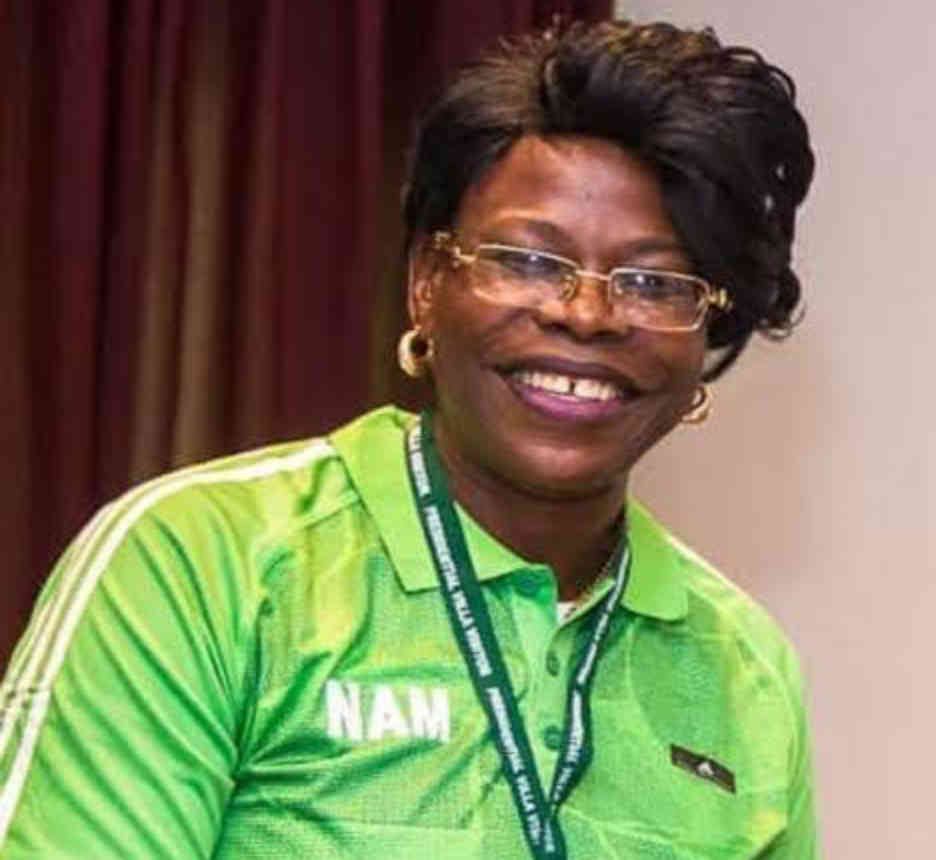
Falilat Ogunkoya (born 1968) remains one of Nigeria’s greatest quarter-milers. She became the first Nigerian to win an individual track Olympic medal, claiming Bronze in the 400m at Atlanta 1996 in 49.10s, a time that still stands as the African record.
She also won Silver in the 4×400m relay at the same Games, cementing her place as one of Africa’s most decorated female athletes. Her dominance extended to multiple African and All-Africa Games medals.
Her role was massive in shaping athletics in general for Nigerians who today are taking over the global map. She remains one of the few who are still alive and doing enough to contribute back to the sports industry in Nigeria.
As of today, she needs to be celebrated more as she continues to effortlessly play a big role for the younger generation, who have learned a lot from meeting her and seeing her achievements.
Ogunkoya Career Highlights
| Full Name | Falilat Ogunkoya |
|---|---|
| Born | 5 December 1968 — Ode-Lemo, Ogun State, Nigeria |
| Specialty | 400 metres sprint |
| Personal Best | 49.10 sec (Atlanta 1996 Olympics — still Nigerian record) |
| Olympic Games | 1996 Atlanta — Bronze Medal, 400m • Silver Medal, 4×400m Relay |
| World Championships | Finalist and semifinalist across 400m and relays (1991–1999) |
| African Championships | Multiple Gold Medals in 400m and 4×400m Relay (1988, 1989, 1996, 1998) |
| All-Africa Games | Gold and Silver Medals in 400m and 4×400m Relay (1987, 1995, 1999) |
| Commonwealth Games | 1998 Kuala Lumpur — Silver Medal, 400m |
| Year | Event | Result |
|---|---|---|
| 1987 | All-Africa Games (Nairobi) | Gold Medal — 400m |
| 1996 | Atlanta Olympics — 400m | Bronze Medal (49.10s, African Record) |
| 1996 | Atlanta Olympics — 4×400m Relay | Silver Medal |
| 1998 | Commonwealth Games (Kuala Lumpur) | Silver Medal — 400m |
| 1999 | All-Africa Games (Johannesburg) | Gold Medal — 400m |
5. Mary Onyali-Omagbemi – Athletics (100m & 200m)
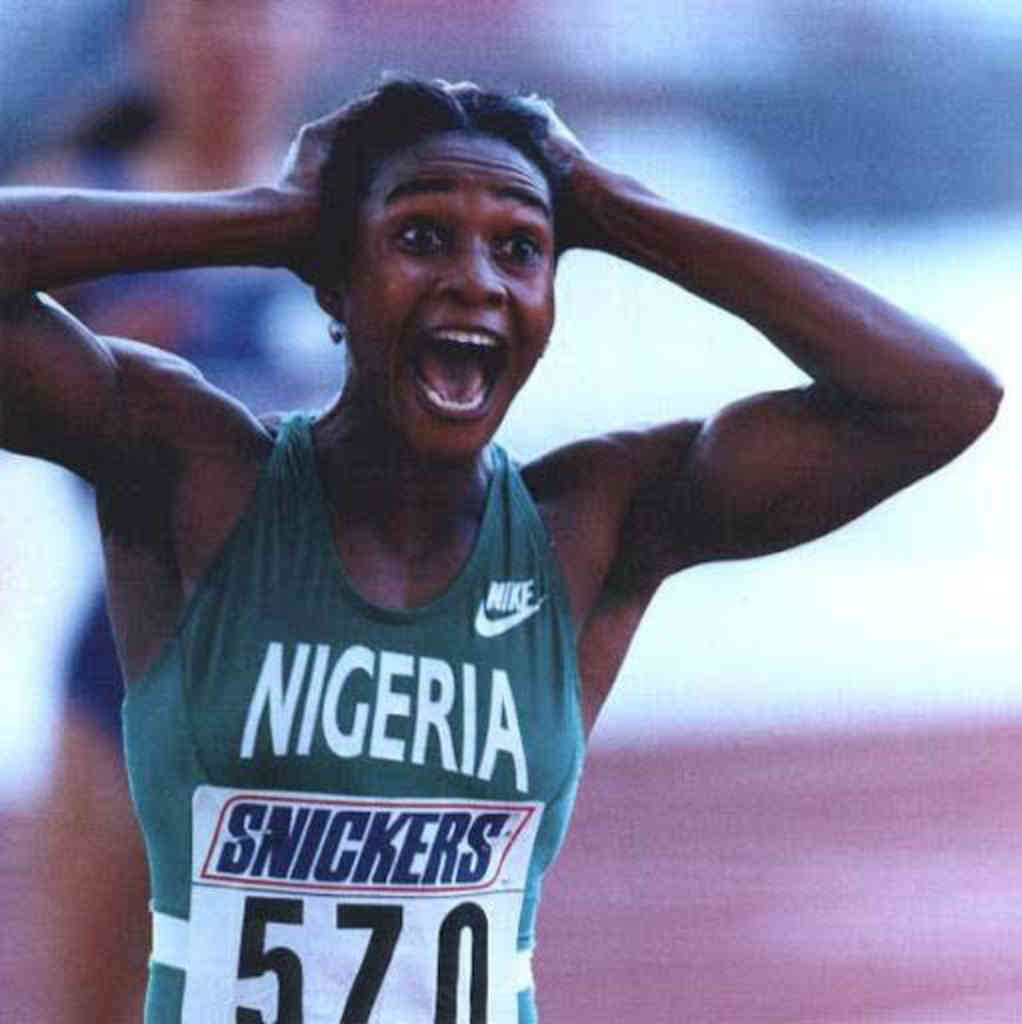
Mary Onyali (born 1968) is a legend in African sprinting. She is Nigeria’s only athlete to compete in five consecutive Olympics (1988–2004).
She won two Olympic bronze medals—in the 4×100m relay (1992) and the 200m (1996). She also won the 100m gold at the 1994 Commonwealth Games, alongside multiple All-Africa Games medals.
With personal bests of 10.97s (100m) and 22.07s (200m), she was a consistent force in global athletics. Mary is one of the women in Nigeria sports who has contributed more to this day.
She is a living legend who still plays her role whenever the need arises. Mary enjoys a life away from athletics as she isn’t dependent on what the country would do for her as a hero who made an impact.
Mary’s Career Highlights
| Full Name | Mary Onyali-Omagbemi |
|---|---|
| Born | 3 February 1968 — Gusau, Zamfara State, Nigeria |
| Specialty | 100m, 200m sprints |
| Personal Best | 100m — 10.97s (1996) • 200m — 22.07s (1996) |
| Olympic Games | 1992 Barcelona — Bronze Medal, 4×100m Relay • 1996 Atlanta — Bronze Medal, 200m |
| World Championships | Finalist in 100m and 200m (1991–1997) |
| All-Africa Games | Multiple Gold Medals in 100m, 200m, and 4×100m Relay (1987, 1991, 1995, 2003) |
| African Championships | Gold Medals in 100m, 200m, and Relays across editions (1988–1998) |
| Commonwealth Games | 1994 Victoria — Gold Medal, 100m • Silver Medal, 200m |
| Year | Event | Result |
|---|---|---|
| 1992 | Barcelona Olympics — 4×100m Relay | Bronze Medal |
| 1994 | Commonwealth Games (Victoria) — 100m | Gold Medal |
| 1994 | Commonwealth Games (Victoria) — 200m | Silver Medal |
| 1996 | Atlanta Olympics — 200m | Bronze Medal |
| 1998 | African Championships — 100m & 200m | Gold Medals |
| 2000 | Sydney Olympics — 100m & 200m | Semifinalist |
4. Modupe Oshikoya – Athletics (Heptathlon & Jumps)
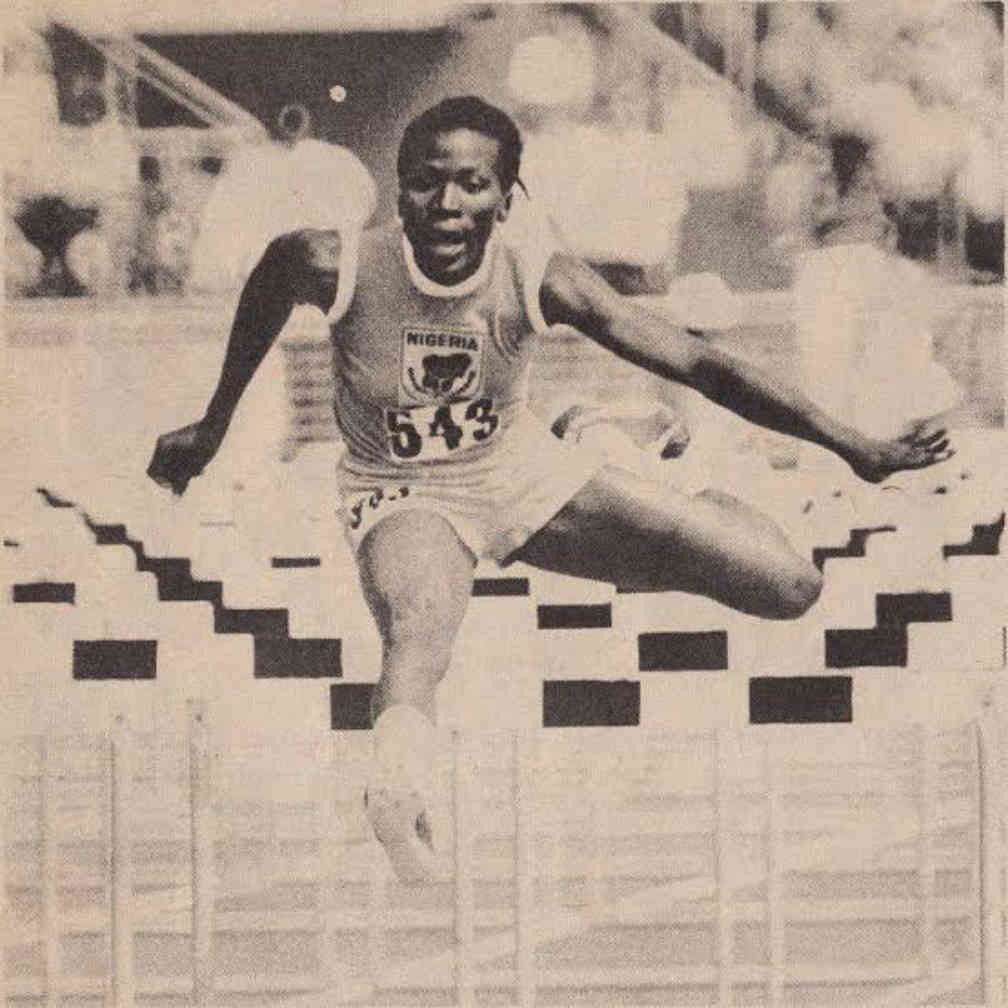
Modupe Oshikoya was Nigeria’s multi-event queen of the 1970s. She won the Commonwealth Games gold in heptathlon (1974) and dominated across sprints, jumps, and combined events at the continental level.
She remains one of the few Nigerian athletes who excelled in such a wide range of events, proving that Nigerian women could compete globally across disciplines.
Oshikoya’s contribution to Nigeria sports is seen in many ways despite her name not being louder enough. Her achievements stand as an inspiration which many young talents see as a milestone for them to make their own path.
She has ventured into something else since her retirement, but she often does make an appearance and helps coach younger talent who come to her for guidance.
Oshikoya Career Highlights
| Full Name | Modupe Oshikoya |
|---|---|
| Born | August 24, 1951 — Nigeria |
| Specialty | Heptathlon, Long Jump, Sprints |
| Olympic Games | Represented Nigeria in 1972 Munich (Long Jump) and 1976 Montreal (Heptathlon, boycott prevented competition) |
| All-Africa Games | 1973 Lagos — Gold Medals in Long Jump, High Jump, and 100m Hurdles |
| African Championships | Pioneering medalist and champion in combined events during the 1970s |
| Collegiate Athletics | 1976 U.S. Collegiate Champion in Heptathlon (UCLA) |
| Trailblazer | One of Nigeria’s earliest female track and field stars, excelling in multiple events |
| Year | Event | Result |
|---|---|---|
| 1972 | Munich Olympics — Long Jump | Competitor |
| 1973 | All-Africa Games (Lagos) | 3× Gold Medals — Long Jump, High Jump, 100m Hurdles |
| 1976 | NCAA Championships (USA) | Champion — Heptathlon |
3. Nduka “The Duke” Odizor – Tennis
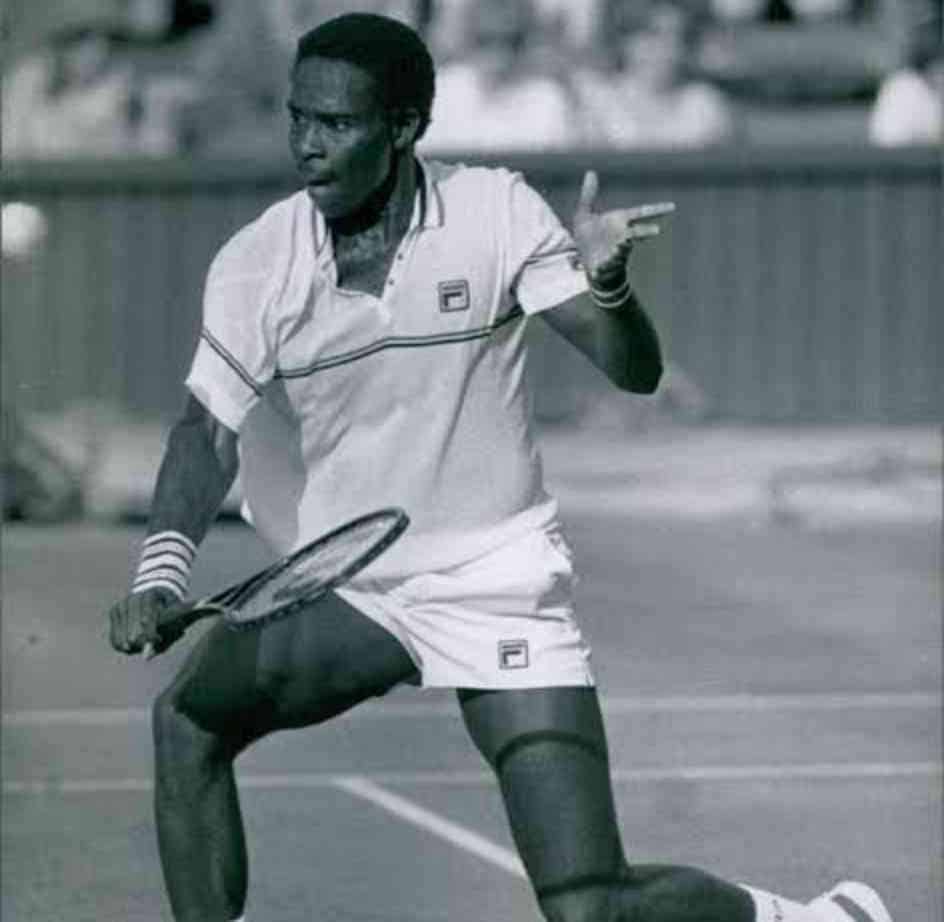
Nduka Odizor is Nigeria’s most successful male tennis professional. He made history by reaching the fourth round at Wimbledon in 1983, an achievement no other Nigerian has matched.
He also climbed into the ATP top-70 rankings, competing at the highest level of global Tennis during the 1980s. His career inspired a generation of African tennis players, though Nigeria has since struggled to replicate his success.
Despite TennisTennis not being a big part of Nigerian sports, he did make a break in his active days, and today, there hasn’t been anyone able to carry on where he left things off many decades ago.
The younger generation who go into TennisTennis sees their break as a starting point in which they are still fighting to make their mark and go further by putting Nigeria’s name beyond its current ranks.
Nduka Career Highlights
| Full Name | Nduka Odizor |
|---|---|
| Nickname | “The Duke” |
| Born | 9 August 1958 — Lagos, Nigeria |
| Sport | Tennis |
| Playing Style | Right-handed |
| Career High Ranking | Singles — No. 52 (1983) • Doubles — No. 20 (1984) |
| ATP Titles | 1 Singles Title (Taipei, 1983) • 7 Doubles Titles |
| Grand Slam Best | Wimbledon 1983 — 4th Round (Singles) |
| Davis Cup | Represented Nigeria in multiple ties during the 1980s |
| Notable | First Nigerian to win an ATP Tour-level singles title |
| Year | Event | Result |
|---|---|---|
| 1983 | ATP Taipei (Singles) | Winner — Only ATP Singles Title |
| 1983 | Wimbledon Championships (Singles) | Reached 4th Round |
| 1984 | ATP Doubles Season | Career-high Doubles Ranking — World No. 20 |
| 1980s | Davis Cup — Representing Nigeria | Key Player in Singles & Doubles |
2. Teslim “Thunder” Balogun – Football
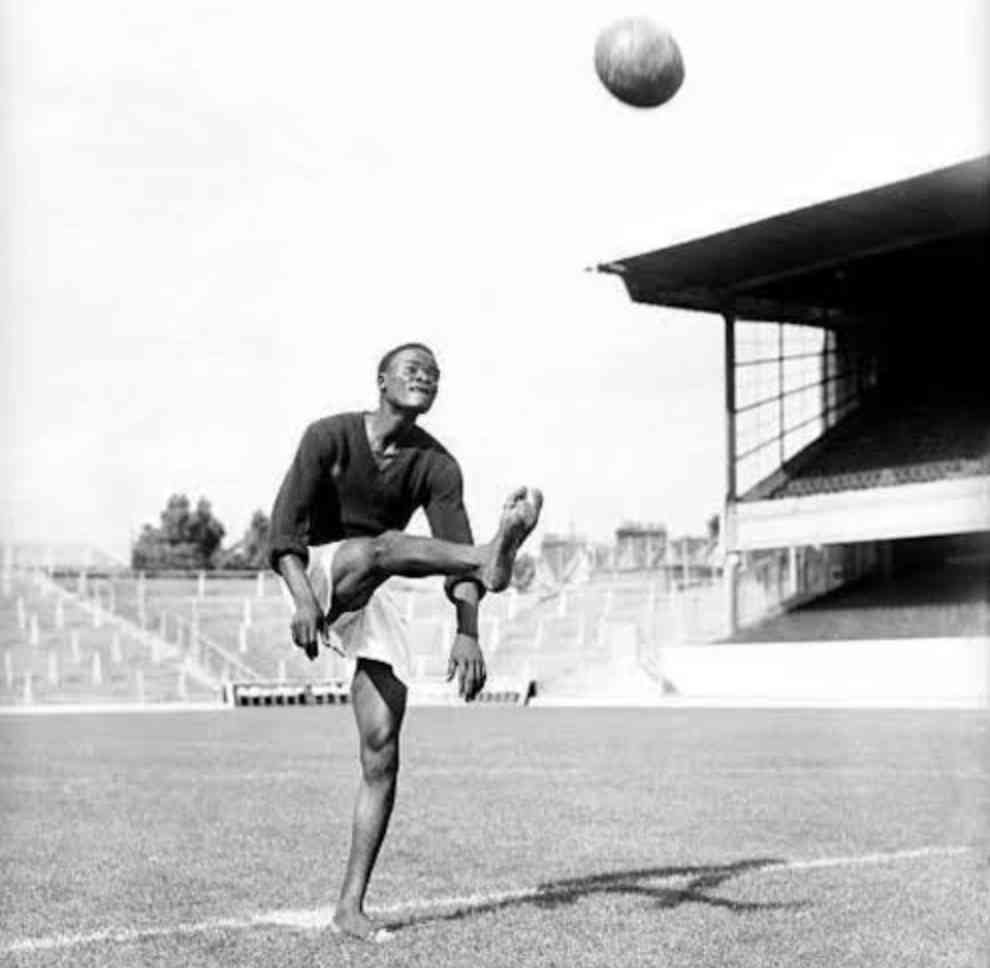
Teslim Balogun (1927–1972) was a Nigerian striker famed for his thunderous shots. He was one of the first Nigerians to play professional football in England, breaking ground for others.
In Nigeria, he played for several clubs and scored prolifically in local leagues, earning a legendary reputation. Despite limited footage, Balogun’s legacy as a pioneer remains significant.
Football isn’t complete without mentioning this name, despite his death being many decades ago. The generations that have come over the years have drawn inspiration from Balogun’s career and achievements.
Despite how Football used to be in his time, he made sure Nigeria became a driving force when talking about sports in general. His talents were seen across as he had success in England, where many Nigerians play today.
Teslim Career Highlights
| Full Name | Teslim Balogun |
|---|---|
| Nickname | “Thunder” |
| Born | 1927 — Lagos, Nigeria |
| Died | 30 July 1972 — Lagos, Nigeria |
| Sport | Football (Soccer) |
| Position | Centre Forward |
| National Team | Represented Nigeria (1940s–1950s) |
| Domestic Career | Played for clubs in Nigeria and England (including Queens Park Rangers, Holbeach United, and Peterborough United) |
| FA Cup History | First Nigerian/West African to play in an English FA Cup match |
| Nickname Origin | Earned “Thunder” for his powerful shots on goal |
| Coaching Career | Became Nigeria’s first African qualified professional coach |
| Legacy | Teslim Balogun Stadium (Lagos) named in his honour |
| Years | Club | Country |
|---|---|---|
| 1940s | Marine FC, Lagos Railways | Nigeria |
| 1950s | Jos XI, Ibadan Lions | Nigeria |
| 1950s | Queens Park Rangers | England |
| 1950s | Holbeach United | England |
| 1950s | Peterborough United | England |
| Late 1950s–1960s | Returned to Nigerian clubs (various) | Nigeria |
| Year | Event | Result |
|---|---|---|
| 1949 | UK Tour with Nigerian National Team | Scored goals, gained international recognition |
| 1950s | Club Career in England | Played for QPR, Holbeach, and Peterborough United |
| 1960s | Coaching Career | Pioneered Nigerian football coaching, led domestic teams |
1. Samuel Okwaraji – Football
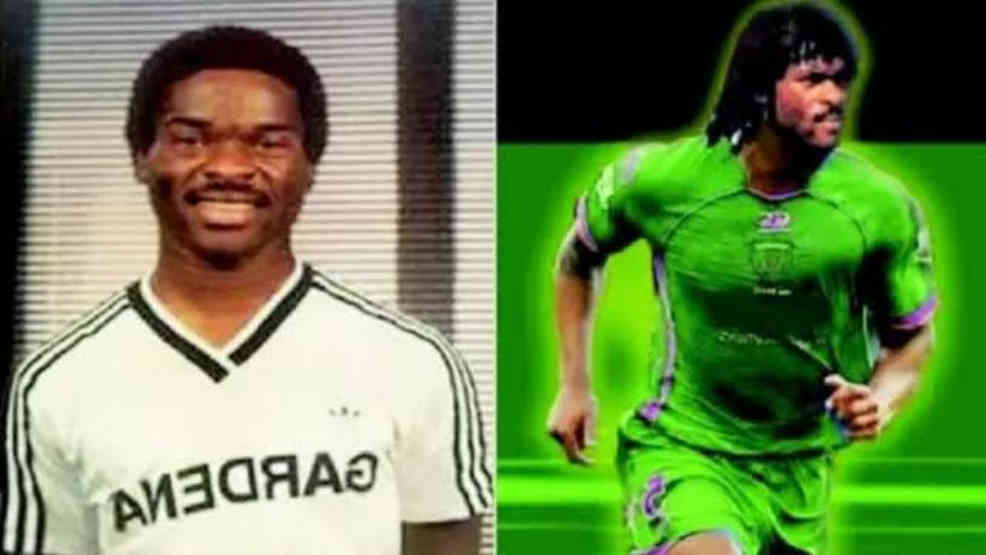
Samuel Okwaraji (1964–1989) embodied patriotism. A gifted midfielder and lawyer, Okwaraji collapsed and died on August 12, 1989, while playing for Nigeria in a World Cup qualifier against Angola.
Before his tragic death, he had represented Nigeria with distinction, combining intellect with football artistry. Today, his name symbolises sacrifice, though institutional remembrance remains limited.
Samuel Okwaraji is a name that still rings a bell to so many people, as he died while playing for Nigeria. He is often celebrated by the Football body for his dedication and sacrifice until his final breathe, which was in action.
His death brought about more investment and care when it comes to the medical department when a football game is going on. His legacy remains one of the biggest in Nigeria alongside Rashidi Yekini and others.
Okwaraji – Career Highlights
| Full Name | Samuel Sochukwuma Okwaraji |
|---|---|
| Born | 19 May 1964 — Orlu, Imo State, Nigeria |
| Died | 12 August 1989 — Lagos, Nigeria |
| Sport | Football (Soccer) |
| Position | Midfielder |
| Years | Club | Country |
|---|---|---|
| 1980s | AS Roma (youth/reserves) | Italy |
| 1980s | Dinamo Zagreb | Yugoslavia |
| 1980s | VfB Stuttgart II | West Germany |
| 1980s | SSV Ulm 1846 | West Germany |
| Caps | 8+ appearances for Nigeria (1988–1989) |
| Major Tournament | 1988 African Cup of Nations Finalist (Nigeria lost 1–0 to Cameroon) |
| Olympics | Played in qualifiers for the 1988 Seoul Olympics |
| Legacy | Died on the pitch during a 1990 World Cup qualifier against Angola (1989); remembered as a patriotic player |
| Year | Event | Result |
|---|---|---|
| 1988 | African Cup of Nations — Morocco | Runner-up (Nigeria lost to Cameroon in the final) |
| 1989 | World Cup Qualifier vs Angola | Collapsed and died during match in Lagos |
| Memorials | Statues and murals in Lagos and Imo State honour his sacrifice |
| National Recognition | Honoured posthumously by the Nigerian government and football associations |
| Annual Tributes | Remembered each year on the anniversary of his death by Nigerian football fans |
| Legacy | Symbol of patriotism and dedication — played without demanding pay for the national team |
These said forgotten heroes of Nigerian sports paved the way for success that is being enjoyed by today’s generation, who carry on the legacy for many years to come.
The country has seen many heroes come and go, just like Okwaraji, Rashidi Yekini, with others who took the country far when talking about sports in general.
The new generation of today has, in one way or another, shown their appreciation to those who paved the way, despite it not being a consistent thing.
The forgotten heroes of Nigerian sports remain a piece of the country’s legacy, and many are calling for them to be celebrated more after the death of another legend called Peter Rufia, who died in 2025.

